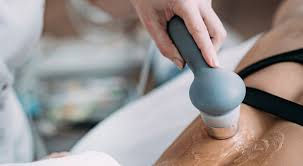UNDERSTANDING MUSCLE CRAMPS: Causes, Types & Treatment
- Nicolas Pahud

- Jan 15, 2024
- 4 min read
Updated: Nov 13, 2025

Muscle cramps are a common and often painful occurrence that many people experience. They are sudden and involuntary contractions of muscles, that can be a discomforting and often painful experience. These spontaneous spasms are still not well understood but have been hypothesized to typically occur due to muscle fatigue, dehydration, electrolyte imbalances or overexertion during physical activity. While generally harmless, understanding their triggers and adopting preventative measures can help manage and alleviate the frequency and intensity of the muscle cramps.
In this brief blog post, we will explore the definition of muscle cramps, their various types, potential causes, and treatment options.
What Are Muscle Cramps?
Muscle cramps are sudden, involuntary, and painful contractions of one or more

muscles. While the exact cause of muscle cramps remains a mystery, they are believed to result from spontaneous ectopic discharges of motor nerves or motor axons' terminal branches. Simply put unexpected abnormal signals from the nerves that control muscle contractions and movement.
Types of Muscle Cramps
Muscle cramps can be classified into three main types based on their patterns and presumed causes:
1.Exercise-Induced Cramps:

These are the most common and occur as a physiological response to prolonged and excessive exercise. Interestingly, their incidence increases during the last trimester of pregnancy.
2. Idiopathic Cramps:

These cramps often occur at night without a clear cause, mainly affecting elderly individuals. They typically involve calf or foot muscles and can be exacerbated by passive plantar flexion of the foot during sleep.
3. Symptomatic Cramps:

These cramps are secondary to an underlying condition or triggered by external factors. They often result from a combination of endogenous and exogenous factors, affecting a minority of patients, particularly the elderly.
Potential Causes of Exercise-Induced Muscle Cramps
Two hypotheses attempt to explain the potential causes of exercise-induced muscle cramps:
1.Dehydration and Electrolyte Hypothesis
This theory suggests that cramps result from excessive sweating during exercise and inadequate rehydration, leading to changes in fluid balance and electrolyte deficits within the muscles.
2.Neuromuscular Hypothesis
This hypothesis proposes that muscle cramps occur due to altered afferent synaptic feedback caused by muscle fatigue, resulting in increased neural activity and muscle cramps.
Treatment Options for Muscle Cramps
The treatment of muscle cramps varies depending on the underlying cause and type of cramps. One potential approach to managing muscle cramps is through physiotherapy services in Edmonton which involves stretching exercises, massage, and other techniques aimed at addressing muscle weakness and promoting overall muscle health.
Stretching Exercises

Gentle Stretching of the affected muscles can help alleviate muscle cramps and prevent them from recurring. Regular stretching exercises may improve flexibility, reduce muscle tightness and increase the range of motion in joints. This may contribute to a reduction in muscle cramps, especially those induced by exercise. Stretching may also enhance blood circulation to the muscles, promoting better nutrient and oxygen supply. This improved circulation can contribute to muscle health and reduce the risk of cramps.
Massage

Massage therapy may be beneficial in reducing muscles cramps by promoting blood circulation and relaxing tense muscles. Massage therapist's at Shift Physiotherapy & Wellness use targeted massage techniques may help reduce muscle tension.
Education & Lifestyle Modifications

Physiotherapists often provide education on lifestyle modifications that can help reduce the risk of muscle cramps. Lifestyle modification like limiting alcohol and caffeine intake, and maintaining proper hydration can help reduce muscle cramps.
Pacing yourself during physical activities, especially if you are not accustomed to intense exercise. Gradually increase the intensity and duration to allow your muscles to adapt.
Practice stress-reduction techniques such as deep breathing, meditation, or yoga. Stress can contribute to muscle tension and cramping.
Muscle Conditioning

Strengthening exercises targeting specific muscle groups can contribute to better muscle conditioning and may reduce the frequency and intensity of cramps.
Engage in regular, moderate-intensity exercise to begin. This can improve overall muscle health and reduce the likelihood of cramps.
Gradually warm up your muscles by completing some dynamic stretches before engaging in intense physical activity. This helps prepare your muscles and may reduce the risk of cramps.
Hydrotherapy

Water-based exercises or hydrotherapy may provide relief from muscle cramps. The buoyancy of water can reduce the impact on joints while facilitating gentle muscle movements.
Hydrotherapy, particularly warm water immersion, may promote blood circulation, potentially aiding in muscle relaxation and reducing the occurrence of cramps.
Alternative Therapies

A naturopathic doctor will take a holistic approach to your health and wellbeing, focusing on natural therapies, lifestyle changes, and prevention strategies. An ND may employ a combination of strategies to help manage muscle cramps including:
Identifying and addressing nutritional deficiencies that could contribute to muscle cramps.
Recommending dietary supplements, such as magnesium or vitamin D, if deficiencies are identified and thought to be contributing to muscle cramps.
Advising on proper hydration practices to maintain electrolyte balance and prevent dehydration, which can contribute to muscle cramps.
Utilizing acupuncture points on the body to potentially alleviate muscle cramps and tension.
Providing guidance on lifestyle factors that may contribute to muscle cramps, such as stress management, proper sleep, and regular exercise.
In conclusion, while muscle cramps are a common occurrence, their treatment remains a subject of ongoing research. Mainstays of management include evaluating and addressing potential causes and determining lifestyle factors that may contribute to cramps, and identifying and treating underlying conditions when present. The choice of treatment should be tailored to each patient's specific needs and circumstances, always under the guidance of a healthcare professional. Let Shift Physiotherapy & Wellness be your muscle cramp rescue squad! Our physiotherapists, massage therapist and naturopathic doctor are all under one roof, ready to kick those muscle cramps to the curb. Consider us your one-stop-shop for muscle management.




Comments